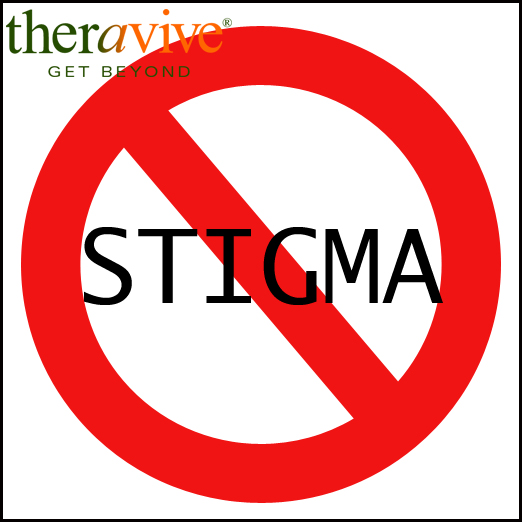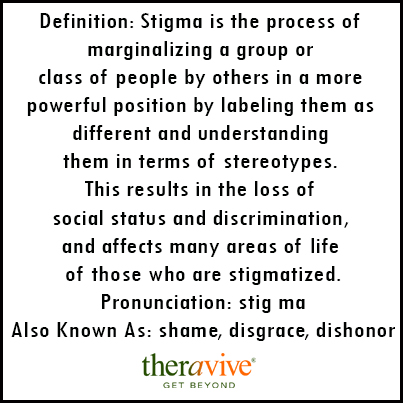 Definition:
Definition:
Stigma is the process of marginalizing a group or class of people by others in a more powerful position by labeling them as different and understanding them in terms of stereotypes. This results in the loss of social status and discrimination, and affects many areas of life of those who are stigmatized.
Pronunciation: stig ma
Also Known As: shame, disgrace, dishonor
Citation: What is Stigma? Hartney, Elizabeth.
When it comes to stigma, prejudice and biases, we all have them. Those who are unaware of their specific biases and prejudices are the people who often cause the most harm. However, none of us are completely aware of our biases; we all have blinders that prevent us from seeing things clearly.
When it comes to mental health, there are many issues that lead to stigma. Misinformation, fear, stereotypes and other commonly accepted media references are among the worst offenders. Additionally, much discrimination is caused by institutionalized prejudice. This type of bias is more difficult to identify, as it has become a part of the cultural and societal norms and mores.
Think of the subtle forms of racism and sexism in the South, or well-meaning medical providers who have been indoctrinated to believe stigmatizing thoughts and ideas about groups of people, ie. all fat people are lazy. The same institutional biases and stigma exist in the field of mental health and psychiatry about the very people we purport to help. It is little wonder people with mental health conditions often refuse to seek or accept help for these problems.
It might be useful to examine your personal thoughts and beliefs to determine if you have any biases and prejudices toward people with mental health conditions. Consider the following:
Where do you get your information about mental health and mental illness?
 Is it a credible source (the news, television, Facebook and random internet posts are not credible)? Is it passed down from other family members, friends or ‘common knowledge’? If so, take a few minutes to research ‘common knowledge’ aka stereotypes to determine if it is true, based on current research. Check credible sources, like the Mayo Clinic, the CDC or National Institute of Mental Health. Question outdated beliefs and challenge ‘common knowledge’ in light of new research in the area of brain health and neuroscience.
Is it a credible source (the news, television, Facebook and random internet posts are not credible)? Is it passed down from other family members, friends or ‘common knowledge’? If so, take a few minutes to research ‘common knowledge’ aka stereotypes to determine if it is true, based on current research. Check credible sources, like the Mayo Clinic, the CDC or National Institute of Mental Health. Question outdated beliefs and challenge ‘common knowledge’ in light of new research in the area of brain health and neuroscience.
· The probability that you know someone who has a ‘mental illness’ is great. About one in four adults in the US have a diagnosable mental health disorder. Mental health disorders are not only psychotic disorders that result in hallucinations or delusions. Any condition that results from problems related to brain function is considered a mental health condition, or mental illness. This includes:
- Different types of anxiety disorders (OCD, panic disorder, PTSD, generalized anxiety),
- Depressive and mood disorders (major depression, manic depressive disorder aka Bi Polar disorder, seasonal affective disorder, postpartum depression, etc.)
- Attention deficit disorder, autism, learning disorders, etc.
- Dementia, Alzheimer’s Disease
- Eating disorders, substance abuse and addiction.
· Mental health functioning is part of our overall health. Mind/body medicine is no longer considered a new age concept. Among other changes in healthcare in the US, the Affordable Care Act will soon level the playing field for those with mental health conditions. These ‘maladies’ will soon be treated by many primary care doctors who partner with mental health providers as part of a total wellness plan aimed at prevention and reduction of long-term health (including mental health) problems. People with mental health conditions will no longer be shamed into hiding their problems, as the whole person will be the target of treatment.
· Current research indicates that many of the mental and physical health conditions Americans suffer from result from poor nutrition, lack of exercise and lifestyle choices. Here are a few examples of how our busy American lives are ruining our physical and mental health. Many of these are related, but thankfully most are treatable without medication.
- Stress – leads to poor immune function, anxiety, TMJ, sleep disturbance, poor eating patterns/eating disorders and more
- Poor sleep – leads to multiple health conditions, depression, anxiety, attention and concentration problems, obesity and more
- Lack of exercise – leads to multiple health conditions, obesity, sleep disturbance, attention and concentration problems, depression and more
- Poor nutrition – obesity, bone and joint problems, depression, anxiety, poor immune function and more.
If you find yourself dealing with mental health symptoms or a mental health diagnosis, talk about it. The more we come out of hiding about mental health conditions, the less fear, stigma, bias and prejudice will exist. When you hear (or think) of stereotypes based on misinformation, correct it. Speak up against mental health stigma!
_______________________________________________________________________________________________________
Hartney, Elizabeth. "What Is Stigma?" Web log post. About.com Addictions. N.p., n.d. Web. 12 Sept. 2013.
Samantha, Gluck. "Stand Up For Mental Health Campaign." Web log post. Healthy Place. HealthyPlace.com, n.d. Web. 12 Sept. 2013.
"The Numbers Count: Mental Disorders in America." NIMH RSS. National Institute of Mental Health, n.d. Web. 12 Sept. 2013.
About the Author
 LuAnn Pierce, LCSW
LuAnn Pierce, LCSWI am a clinical social worker, therapist and writer. Currently, I offer online therapy and coaching services to people in Colorado and Wyoming. As a provider for the CO Department of Vocational Rehabilitation and the National MS Society, my expertise in counseling people who have disabilities and chronic illness is considerable. I have written for About.com, DailyRx.com, Theravive.com, GoodTherapy.org, SelfHelpMagazine.com and contribute to several other online health and mental health sites.
Office Location:
19th & Dahlia
Denver, Colorado
80220
United States
Phone: 303-910-2425
Contact LuAnn Pierce, LCSW
Professional Website:
http://HireASocialWorker.com